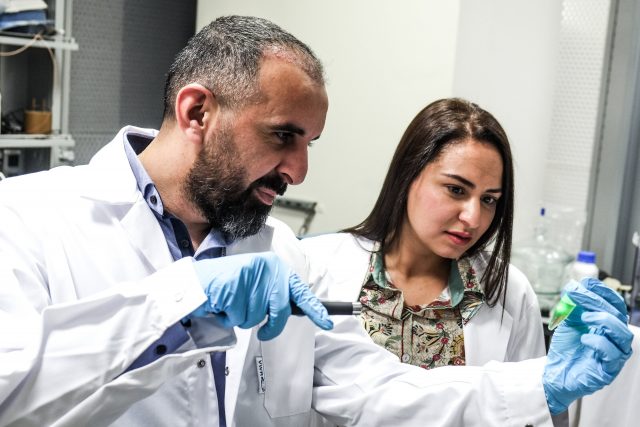A revolutionary technology developed within the Trabolsi Research Group at NYU Abu Dhabi (NYUAD) could dramatically improve the wellbeing of diabetic patients: an insulin oral delivery system that could replace traditional subcutaneous injections without the side effects caused by frequent injections.
Using prepared layers of nanosheets with insulin loaded in between layers to protect it, the researchers developed gastro-resistant imine-linked-covalent organic framework nanoparticles (nCOFs) that exhibited insulin protection in the stomach as well in diabetic test subjects whose sugar levels completely returned to normal within two hours after swallowing the nanoparticles. Led by NYUAD’s Research Scientist Farah Benyettou and Program Head of Chemistry Ali Trabolsi, the findings were published today in Chemical Science.
Compared to the two FDA-approved technologies for the oral delivery of insulin, the system developed at NYUAD is biocompatible, highly stable in the stomach, specific, and able to deliver the right amount of insulin based on the diabetic subject’s blood sugar levels. This treatment represents a step forward in treating this disease, which is the seventh leading cause of death worldwide.
“Our work overcomes insulin oral delivery barriers by using insulin-loaded nCOF nanoparticles which exhibit insulin protection in the stomach as well as a glucose-responsive release,” said Benyettou. “This technology responds quickly to an elevation in blood sugar, but would promptly shut off to prevent insulin overdose and will dramatically improve the well-being of diabetic patients across the UAE and worldwide,” she added.
Provided by: New York University
Find your dream job in the space industry. Check our Space Job Board »
More information: Farah Benyettou et al. In vivo oral insulin delivery via covalent organic frameworks. Chemical Science (2021). DOI: 10.1039/D0SC05328G
Image: NYUAD’s Research Scientist Farah Benyettou and Program Head of Chemistry Ali Trabolsi.
Credit: NYU Abu Dhabi











